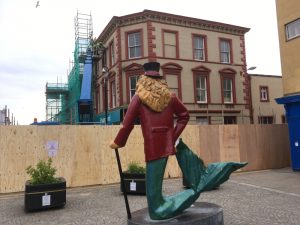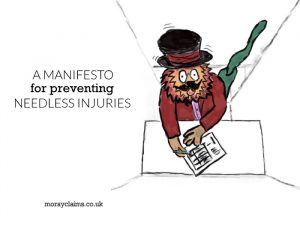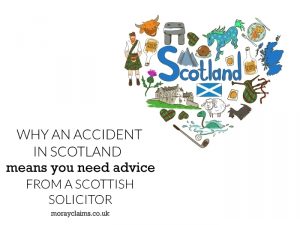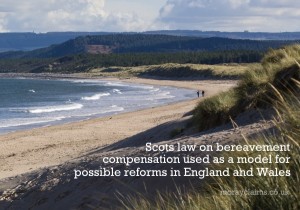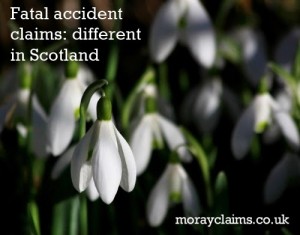Elgin's Dandy Lion has not had a view up the High Street to Dr Gray's Hospital since May 2018. In the meantime, his view has been blocked by wooden hoardings as Poundland first had structural problems and then a fire. We’ve had piles of metal on the site, from the “scaffolding mountain” to the beginnings of the new Poundland construction. In the various photos below, there is a similarity but there's also gradual progress. In the law relating to bereavement compensation in Scotland, there can be a superficial sameness to things but, again, under the surface, there is progress and milestones are being achieved. We’ll look at one of these progression points in this article. For fatal accident claims, in Scotland, this is one area where the law is quite different to that in England and Wales. This is particularly the case for compensation awarded for the grief and sorrow caused by deceased’s death – often referred to as compensation for “loss of society”. Those pushing Continue Reading
Bereavement Damages Articles
Claims for compensation arising out of the death of a close relative are quite specialised in Scotland and an area where the law has been in a state of flux for the last 20 years or so. The law is significantly different in Scotland to other parts of the UK. This page collects together the various articles on our website which deal with issues relating to fatal claims and bereavement damages in Scotland.
Prevention of needless injuries (the APIL manifesto)
How many accidents are there in the UK each year which cause injury to people? One estimate is 1.6 million – totalling up harmful incidents across workplaces, hospitals and on the roads. (There were 560,000 casualties on the roads in 2018). All of these are preventable injuries. Yet they can have permanent, life-changing consequences not just for the injury victims but also for their families. On the other side of the picture, the wrongdoer who caused the injuries – an employer, the NHS, a business, a local authority – can suffer damage to reputation as well as financial cost. Every year, the Association of Personal Injury Lawyers (APIL) hosts Injury Prevention Day. It encourages us all to think about ways we can adjust our conduct to minimise the risk of harm to others (e.g. avoiding tailgating the vehicle in front if we are driving). Everyone has a part to play in reducing accidental injuries but, for maximum effectiveness, the lead has to come from government. It is our Continue Reading
Why an accident in Scotland means you need advice from a Scottish solicitor
If you have an accident in Scotland, you need to get advice from a Scottish solicitor. People contact us with personal injury related questions via this website from all over the place (not always in the UK and not always even in Europe). Where the enquiry is about an accident that happened outwith Scotland, we cannot help you directly but we can often use our professional contacts to point you in the right direction. It’s even more focused than "Scotland" for us, however, because we concentrate our main efforts on helping clients in our home area of Moray and a bit beyond that. One phone enquiry we received recently caused us a lot of concern and that’s the seed for this article: The risk that you might have a question about injuries arising from an accident in Scotland but not get advice from a Scottish solicitor. Here’s (an anonymised version of) the scenario that came from the phone enquiry mentioned above. A parent of the caller had died as the result of a road Continue Reading
Why you might be surprised who qualifies as a cohabitee (more people than you’d expect)
In modern society, cohabitation is an increasingly popular family structure. As one aspect of the response to this change, the Family Law (Scotland) Act 2006 was enacted to provide particular limited rights to cohabiting couples. On the breakdown of their relationship within their lifetimes, a former cohabitee has the chance to make a claim for financial provision from his or her former partner. On the death of one of them – provided they did not leave a will – the survivor can make a claim for financial provision from the deceased’s estate. The time limit for a “separation” claim is one year from the date of separation and, for a “death” claim, only 6 months. These time limits are very short indeed and they cannot be extended. As a sort of public information drive, we have a poster we often display outside our offices which summarises the time limit for death claims. If a cohabitee dies as the result of an accident which is due to the fault or breach of duty of Continue Reading
Bereavement Damages – Scots Law Used As A Benchmark For Reform
The Radio 4 consumer programme “You and Yours”, for 14 January 2016, included a section on bereavement damages. It highlighted the fact that, although they say “you can’t put a price on a life”, in fact, we do it all the time. Decisions made about which treatments and drugs are going to be available on the NHS are one example. Another is the way we deal with compensation when someone dies as a result of negligence. Scotland as a benchmark for law reform in England and Wales One MP – a former personal injury lawyer – is asking for a change in the law to allow courts in England and Wales to pay more in compensation than at present and allow a wider range of relatives to claim, when someone has died as a result of negligence. In many ways, the Scottish legal position is being used as the blueprint for the proposed change in the law in England and Wales. Andy McDonald is the Labour MP for Middlesborough and his Private Member’s Bill comes before Parliament at the end of January Continue Reading
Fatal Accident Claims in Scotland: Increased Compensation levels
Claims by three members of the family of a man who died as the result of a road traffic accident in Glasgow have been awarded damages totalling £106,500. Lady Wise, in the Court of Session, decided that the award of compensation in a previous similar case had been too low. She set the damages level for each claimant by applying an uplift of approximately 50% on the awards in the previous case. Pedestrian crossing accident Gavin Currie was 25 years old when he was knocked down on a zebra crossing on 28 December 2011. He died in hospital 2 days later. The Court described Gavin as a “fine young man with good employment prospects and a happy and settled family life”. He came from a close-knit family. Only value of claim disputed Liability for the accident was not in dispute but there was disagreement about the level of compensation to be paid to each of his parents and to his brother, Euan, by the insurers of the negligent driver. Tension between Judge and Jury damages Continue Reading
Fatal Accidents: Another Reason To Make A Will
Something like 7 out of 10 people do not have a Will. There are lots of reasons why you are unlikely to have made a Will. This post tells a story which might convince you to take action and make a Will, if you do not have one. The details are fictional but are based on fact situations we have dealt with in practice. Maggie and Tam – cohabiting couple Maggie had been separated from her husband for several years when she met her partner, Tam, through a mutual friend in 2002. Maggie lived in Moray and Tam was based in the Borders. After a year or so, they decided to move in together, Tam finding a job with a haulage company in Moray. They bought a house using, as a deposit, money Tam had saved. Tam had never been married and had no children. He formed a great relationship with Maggie’s three children – and two grandchildren born during the years after he and Maggie got together. Maggie, in turn, enjoyed the company of Tam’s brother and his parents. They went on Continue Reading
Fatal Accident Claims: Different in Scotland
On 16 July 2009, Peter McGee fell down the stairs at his home in Springburn, Glasgow. Two days later, he died in hospital as a result of complications from his injuries. His wife, Catherine, and other family members raised an action in the Court of Session against RJK Building Services Ltd, who had carried out joinery work at the property on the instructions of Glasgow City Council, Mr and Mrs McGee’s landlords. In an Opinion issued on 18 January 2013, Lord Drummond Young found that RJK were to blame for Mr McGee’s injuries and death because they had been negligent in the way they fitted a handrail on the stairs. The handrail had come loose from the wall as Mr McGee descended the stairs, causing him to fall. A lengthy marriage At the time of his death, Mr McGee was 71 years old. His wife was a few months younger than him. They had been married for 36 years. An area of personal injury law where Scotland is different Personal injury law is applied identically or Continue Reading
